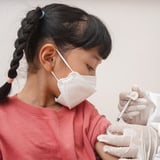
Families with young children finally have the news they've been waiting for: members of the CDC's advisory committee unanimously voted on Tuesday to recommend giving Pfizer's child-size dose of coronavirus vaccine to children ages 5 to 11. Members of the committee spoke about their support of the vaccine, noting that the CDC's analysis shows how the benefits of the vaccine outweigh any risks for this age group. As a last step, CDC Director Dr. Rochelle Walensky will need to sign off on the vote, which is expected to happen soon.
This announcement comes after the Food and Drug Administration authorized Pfizer-BioNTech's vaccine for children ages 5 to 11 on October 29.
The FDA's decision makes the vaccine available to 28 million children in the US, which means that nearly the entire population of the nation is eligible to receive the shot.
The historic move comes several days after the FDA's advisory committee voted 17-0, with one abstention, in favor of recommending children receive the vaccine, which is a lower dose version of its two-shot vaccine – about one-third of the amount given to teens and adults. Although Pfizer had announced in mid-September that a this vaccine was safe, effective, and triggered a healthy immune response in kids as young as 5 years old, there was considerable debate as to whether the benefits of vaccination outweigh the risks for this age group in particular. For instance, advisers cited concerns about the unknown rates of an inflammatory heart condition called myocarditis, and whether children would even need this protection at all.
However, the decision came well within the estimated timeline predicted by Dr. Rochelle Walensky, the director of the Centers for Disease Control and Prevention, who said the FDA deliberation could take months and warned that families might have to wait to get the jab until year's end.
This expansion to children as young as 5 means that parents - who have long had difficulty understanding how to move forward with only adults vaccinated - may be able to protect their children following a tenuous start to the school year, which has seen ramped-up pediatric COVID-19 positivity rates due to the surge of the Delta variant among the unvaccinated.
As for even younger age groups, BioNTech said it has laid out plans to seek approval for the vaccine in children between 6 months and 2 years old later this year.
COVID-19 Vaccine Updates For 12- to 15-Year-Old Kids
This news comes months after the Food and Drug Administration authorized the use of the Pfizer COVID-19 vaccine in children ages 12 to 15 years old in the United States. In early May, the agency amended the current emergency-use authorization to reflect the extended age minimum and include this adolescent group.
That announcement came less than a week after reports revealed Pfizer was expecting to apply to the FDA in September for emergency authorization to administer its coronavirus vaccine to children between the ages of 2 and 11.
In late March, Pfizer reported that none of the 2,260 12- to 15-year-old subjects of its clinical trial who received the vaccine developed symptomatic infections, a sign of significant protection. The drug company said the volunteers produced strong antibodies and experienced side effects similar to those aged 16 to 25.
After it was authorized by the FDA, an immunization advisory committee within the Centers For Disease Control and Prevention met to determine if the CDC would recommend its use in the new age group.
This authorization - which, like the adult vaccine, came much earlier than anticipated - opened up the US vaccination campaign to millions more individuals and was another major step forward in raising the level of immunity in the population, with the ultimate goal to lower the amount of hospitalizations and deaths.
For those parents hesitant to vaccinate their tweens and teens, pediatricians and epidemiologists alike recommend they receive it and note that adolescents in this age group, although technically children, tend to respond to the coronavirus the same way as adults.
Meanwhile, Moderna expects positive results from its own clinical trial of adolescents aged 12 to 17, and has dosage trials underway for children as young as 6 months old that they hope to submit by year's end.

0 Commentaires